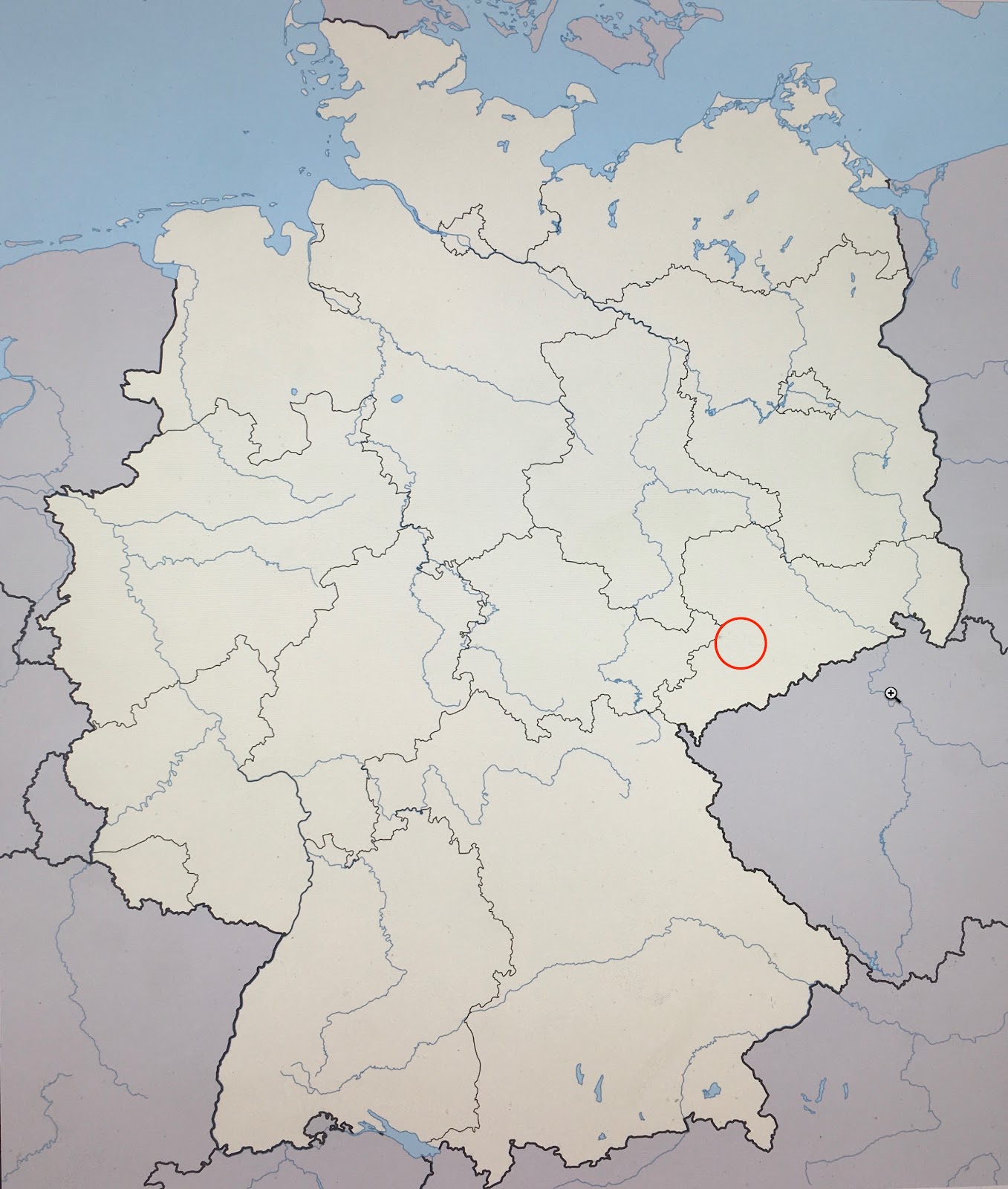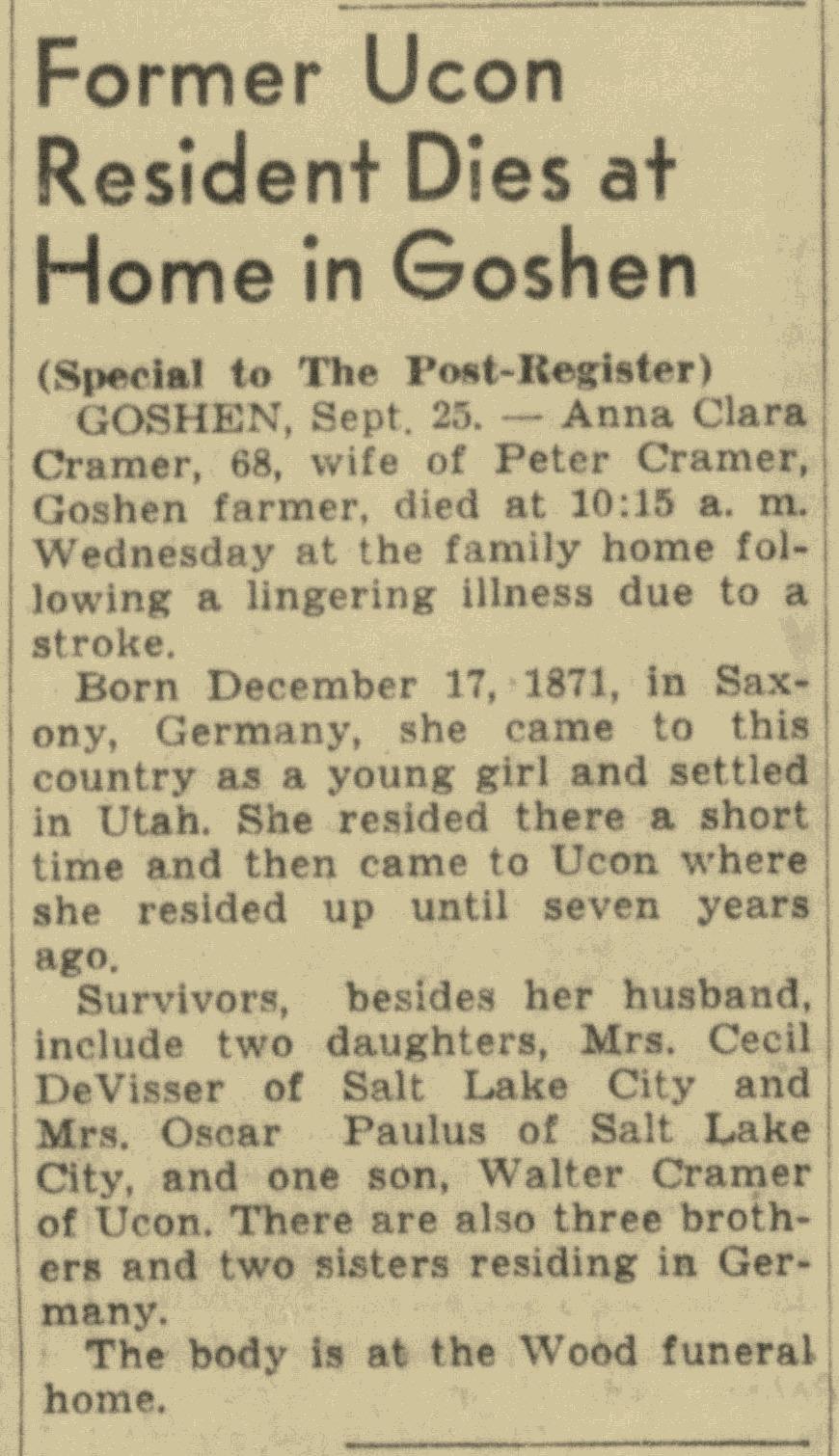Peter Christian Adolph Cramer, my first cousin three times removed, arrived from Denmark in the early 1890s. Anna Clara Lowe, another first cousin three times removed, arrived from Germany about the same time, becoming a member of the LDS Church. It was likely they met after coming to the United States. They probably met in Utah within a few years of their arrival. They married in Salt Lake City in 1895.
Region of Germany where the Lowes lived
Early Silver Mining in Saxony's Ore Mountains, public domain
Emil and Anna Clara wrote letters back and forth, but only a few of Emil's letters remain for us to examine. Little did they know, as they corresponded, that their letters would hint at the unimaginable things that would transpire in the world ten years later. Letters between December 1934 and 1945 highlight a shift in mood exhibited by some Germans pre and post-war.
Apologizing for not being able to send financial assistance to his sister Anna Clara, Emil states, "We may not send money out of the country as all is wanted to build up our new empire and pay our debt… We have been brought down by misgovernment of a gang of international jobbers, robbers, thieves and traitors, who for fourteen years filled their pockets out of our work and savings. "
Emil goes on to thank his sister for her words regarding his leader. In December 1934, he described the leader as the most honest, straightforward man, a hard fighter for the truth and righteousness amongst the nations. "I showed the letter to some friends and officials, who were so pleased with it, I had to copy it for circulation in all offices, clubs, schools and party organisations. I decided to send the original to the Fuhrer and received, after 3 days the following reply:" (in translation)
"Reichskauzlei: Dear Mr. E. Lowe
By order of the Fuhrer and Chancellor, I thank you for notice heartily. The letter of your sister has been taken notice of with great interest as the contents prove, your sister must be an especially brave and religious woman. To such people the work of the fuhrer cannot but make impression. The leader requires you to send greetings & best wishes when you write to your sister again. Heil Hitler! Dr. Thomson Government Councellor."
In 1935 Emil described working conditions at the Wanderer Works factory where a relative worked. Christmas bonuses and paid days off are given to every man for special occasions such as christenings and weddings, and employers encourage employees to talk about their grievances. He tells his sister that the factory, which initially employed 2000 workers, now has 5200. Emil assures his sister that he doesn't understand the concern over the Jews as "not a hair on their heads has been disturbed."
Later, in a letter from 1939, Emil reminds his sister of how difficult life had been in this part of Germany only 10 years before, with unemployment, foreign debt, strikes, and too many political parties. He feels that by 1939, all who can
work are working and that conditions are vastly improved. The single-party control of the government, in his view as played a part in this improvement. He states, "I wish I could write a book about the lovely wonderful time we experienced since our great leader has taken over the government."
In an undated letter after the end of World War II to other family members in the United States, Emil describes the results of the war. "We have gone through a terrible war. Most of our cities are smashed and burned down to a great extent. At the boundery of our place the soldiers made the last hopeless stand for 3 weeks. During the air raid I had my hip damaged and was laid up for 6 weeks."
Few could have foreseen the changes the post-war world would see with the horrors of the extermination of the Jews, the defeat of German armies, the trials at Nuremberg, and the Marshall Plan. In letter after letter, we see the world tumbling inextricably towards the abyss of war, though Emil did not let on or see this was happening. For many of those who lived then, some things were just unimaginable. From our historical perspective, we can see what had been unfolding.
Peter Cramer and Anna Clara Lowe and Family, courtesy of the author
Emil died in 1955, and Anna died in 1940 before America joined the war. Emil continued to communicate with family in the United States through the 1950s.
Obituary for Anna Clara Lowe, Newspaper Archives
Emil Lowe Letters, Cramer Connections, The Cramer Family Newsletter, Editor David B. Oswald, Layton, Utah.
Originally published in Generations, a newsletter of the Southwest Colorado Genealogical Society.




No comments:
Post a Comment